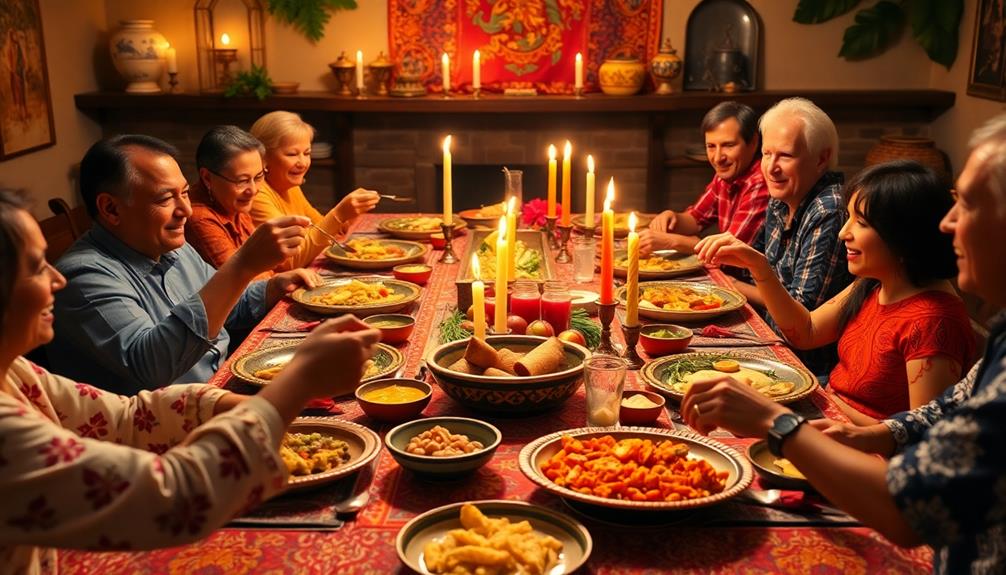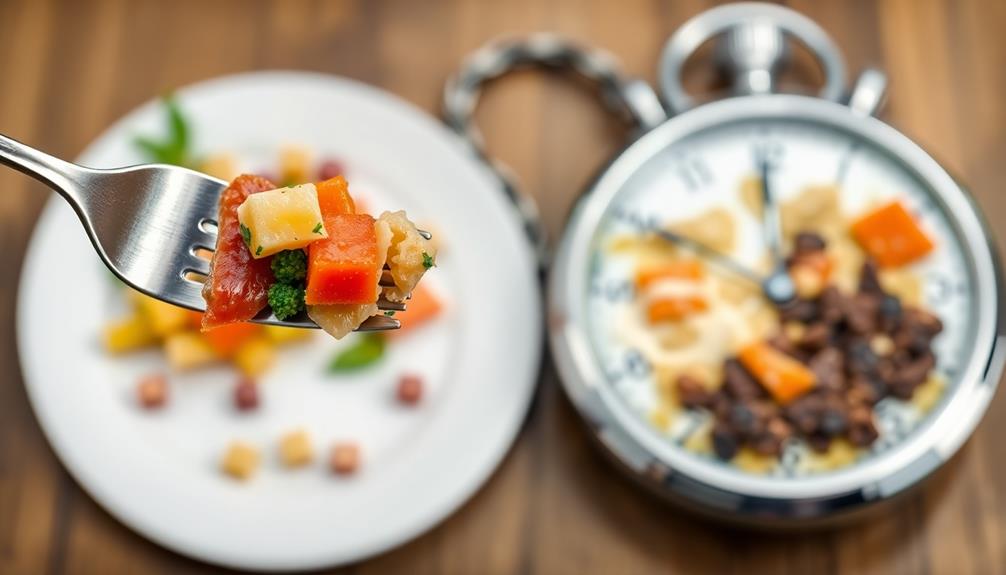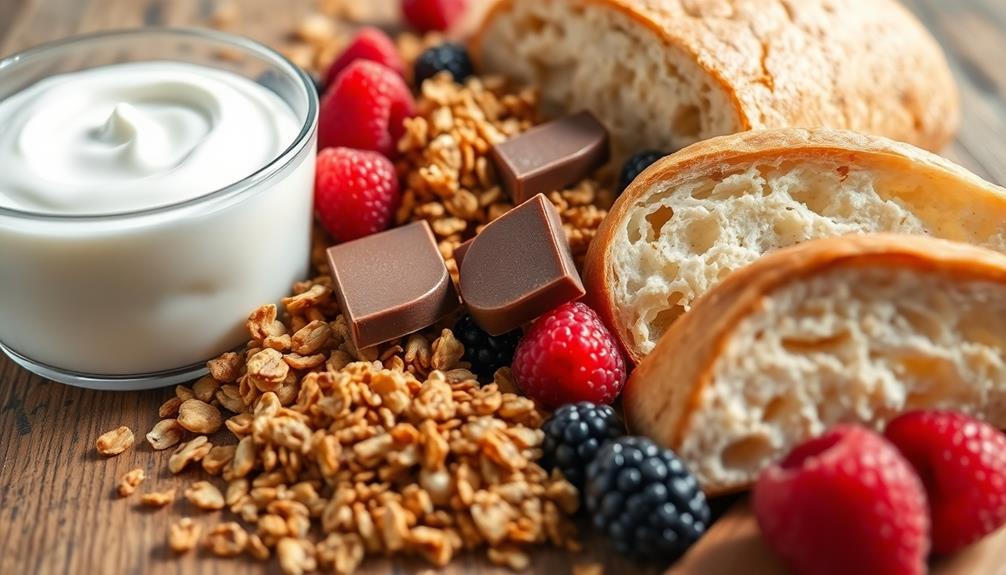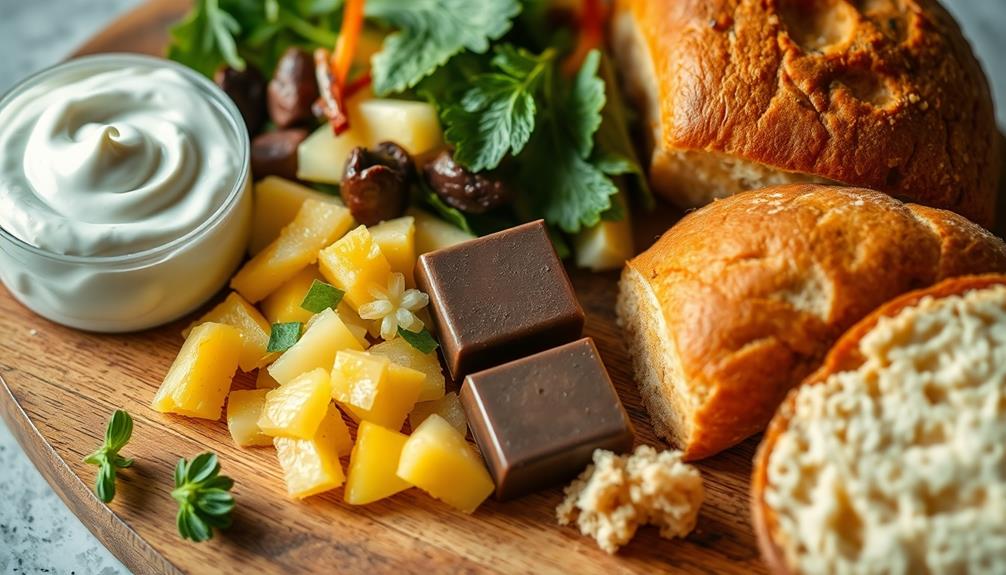Food rituals and traditions are more than tasty treats; they connect families and create joyful experiences! Here's why they matter: They serve as a bridge between generations, passing down stories, values, and heritage through shared recipes and meals. Foods linked to holiday traditions, in particular, hold a special place in our hearts, symbolizing togetherness and cherished memories. Whether it’s baking cookies during festive seasons or preparing a family recipe for a celebration, these rituals strengthen bonds and create lasting joy.
- They strengthen social bonds, making memories that last forever.
- Rituals like saying thanks or sharing special dishes boost happiness.
- Connecting to your cultural roots helps celebrate who you are.
- Shared meals reduce stress and make everyone feel cozy.
So, next time you gather around the table, remember how magical these moments can be! You'll discover even more ways these yummy traditions bring everyone together in the most delightful ways.
Key Takeaways
- Food rituals enhance mindfulness and promote enjoyment, leading to healthier eating habits and a deeper appreciation for meals.
- Shared dining experiences strengthen social bonds, creating lasting memories and fostering a sense of community.
- Traditional foods and recipes preserve cultural heritage, connecting individuals to their identity and history.
- Rituals like prayers before meals enrich the dining experience and instill a sense of gratitude.
- Emotional connections during shared meals lead to the release of oxytocin, boosting happiness and trust among participants.
Understanding Food Rituals
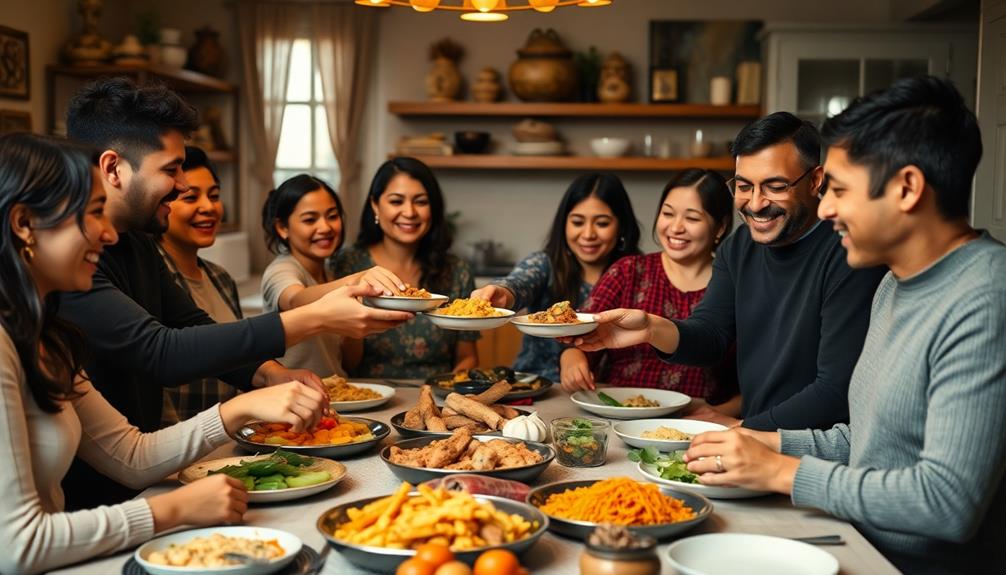
When you think about food rituals, consider how they shape your relationship with what you eat. Food rituals are special practices that make meals more meaningful. For instance, enjoying traditional dishes like Dorayaki (Red Bean Pancake) during family gatherings can enhance the experience and create a shared sense of joy.
They can be as simple as saying a prayer before dinner or as elaborate as sharing a feast with friends and family. These rituals help us connect with our food and each other, reminding us of our cultural traditions.
Here are some reasons why food rituals matter:
- Enhance Mindfulness: When you pause to appreciate your meal, you're more likely to enjoy it and eat healthier.
- Social Bonds: Gathering for a meal can strengthen friendships and family ties. Sharing stories and laughter around the table creates lasting memories.
- Cultural Identity: Food rituals often reflect traditions passed down through generations, helping you feel connected to your heritage.
Psychological Benefits of Rituals

Rituals surrounding food offer profound psychological benefits that can greatly enhance your overall well-being. When you engage in food rituals, you not only enjoy delicious meals but also promote mindfulness and relaxation. These moments can reduce stress and make you feel more at peace.
Here's a quick look at the benefits of food rituals:
| Psychological Benefits | Description |
|---|---|
| Mindfulness | Engaging fully with your meals |
| Social Bonds | Strengthening connections with others |
| Happiness | Boosting serotonin and oxytocin |
| Coping Mechanism | Providing comfort in stressful times |
| Control | Offering predictability in life |
Sharing meals with family or friends creates lasting memories and strengthens social bonds. Plus, the comfort of familiar dishes can bring back warm feelings and nostalgia. When you anticipate and enjoy these rituals, your body releases happy hormones, making you feel joyful and connected.
Cultural Significance of Food

Food holds immense cultural significance, acting as a bridge that connects individuals to their heritage and community. It's more than just what we eat; it's how we celebrate, remember, and share stories.
Think about the joy of gathering around a table for special occasions, like Diwali or Thanksgiving, where specific dishes bring people together. In Lebanese cuisine, traditional foods like Kawarma reflect rich flavors and preservation methods that enhance the meal experience. These meals reflect shared histories and values, creating a sense of belonging.
Here are a few ways food showcases cultural identity:
- Life Cycle Events: Traditional foods play a big role in weddings and funerals, strengthening bonds. For example, kollivo is served at Greek funerals, honoring loved ones.
- Dietary Rules: Practices like kosher and halal not only guide what you eat but also strengthen community ties, giving everyone a sense of belonging.
- Generational Recipes: Family recipes passed down through the years preserve cultural heritage and create lasting memories.
- Shared Meals: Celebrating religious events like Passover or Ramadan encourages community spirit, enhancing connections across diverse backgrounds.
Food truly is a delicious way to celebrate culture, bringing joy, love, and togetherness!
Food Rituals in Practice

Engaging in food rituals can transform everyday meals into meaningful experiences. When you gather around the table, saying a prayer or sharing what you're thankful for can make the moment special. These food rituals not only connect us with our food but also deepen our relationships with family and friends.
For instance, enjoying dishes like bulgogi during family gatherings can evoke feelings of nostalgia and togetherness, reinforcing cultural bonds. Think about the joy of a Passover seder, where you share stories and delicious dishes. It's a chance to celebrate your culture and reinforce bonds with loved ones.
Plus, studies show that these shared meals can reduce stress and promote relaxation. Who wouldn't want that during dinner time?
Food rituals also play a big role during significant life events like weddings and funerals. Preparing special dishes helps honor traditions and create lasting memories.
When you share meals filled with love and care, it promotes feelings of trust and empathy, making everyone feel closer together.
Strengthening Community Through Food
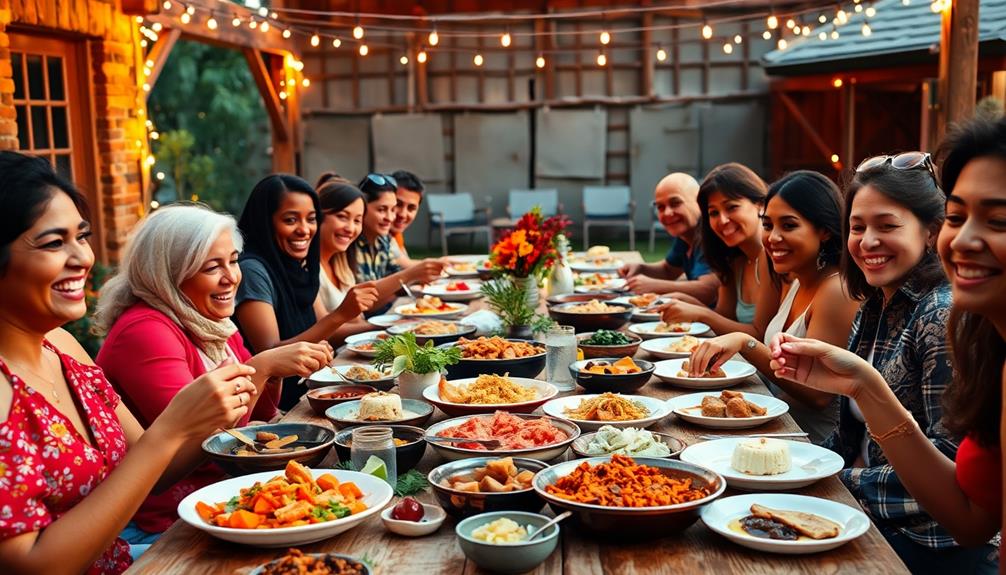
Shared meals often become the heart of community life, fostering connections that go beyond simple nourishment. When people gather for a Thanksgiving dinner or any shared feast, they create a warm environment filled with laughter and stories.
These moments allow everyone to feel included, building a sense of belonging. For instance, using leftover turkey to create a comforting turkey soup can become a cherished family tradition, bringing people together in the kitchen and around the table.
Here's how food strengthens our community:
- Gathering Together: Potlucks and holiday gatherings invite everyone to bring a dish, showcasing diverse culinary traditions and sparking conversations.
- Teamwork in Cooking: Preparing meals together encourages teamwork, helping friends and family bond while discussing nutrition and health.
- Celebrating Life Events: Weddings and religious holidays feature celebratory meals, reinforcing cultural identities and linking generations.
- Emotional Connections: Sharing food releases oxytocin, the "trust hormone," which helps deepen emotional ties and creates a supportive atmosphere.
Frequently Asked Questions
What Is the Food Theory in Psychology?
Food theory in psychology explores how your eating habits and rituals shape your emotions, relationships, and identity. It highlights the impact of shared meals on social bonding and how food can evoke memories and feelings.
What Is the Human Psychology of Food?
Human psychology around food involves deep connections between what you eat and your emotions. Your choices reflect memories, cultural influences, and personal experiences, shaping your identity while fostering social bonds and enhancing overall well-being.
What Is the Psychological Influence of Food?
You'd think food's just about taste, but its psychological influence runs deep. It shapes memories, triggers emotions, and connects you to others, highlighting how a simple meal can elevate your mood and strengthen relationships.
Why Are Food Rituals Important?
Food rituals are important because they deepen your connections with others, enhance your enjoyment of meals, and promote mindfulness. Engaging in these practices can lead to healthier habits and a greater sense of community and belonging.
Conclusion
So, the next time you gather for a family meal or holiday feast, remember that food rituals aren't just about eating. They're about love, joy, and maybe a little chaos, like Grandma's famous recipe gone slightly wrong! These traditions help us feel connected, share stories, and maybe even create a food fight or two. So, let's keep those delicious rituals alive, because who wouldn't want a little extra happiness served right alongside their mashed potatoes?

